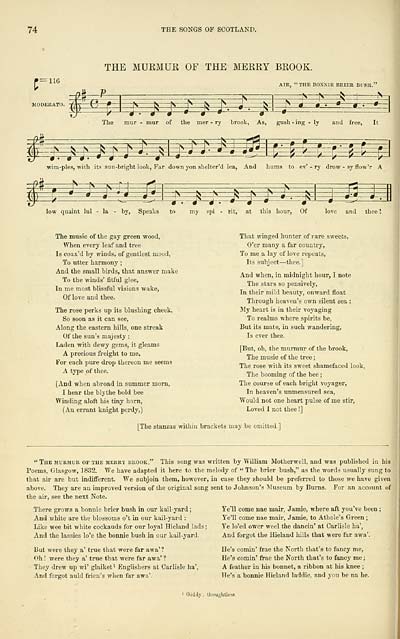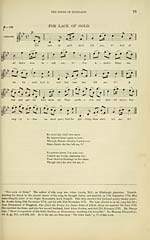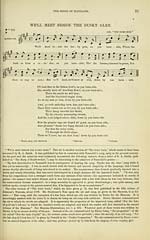Glen Collection of printed music > Printed music > Wood's edition of the songs of Scotland
(98) Page 74 - Murmur of the merry brook
Download files
Complete book:
Individual page:
Thumbnail gallery: Grid view | List view

74
THE SONGS OF SCOTLAND.
'=116
MODERATO.
THE MURMUR OF THE MERRY BROOK.
AIR, "THE BONNIE BRIER Bl'SH.' :
fc^
S
0:
e^fe^
s
^=^=
The mur - mur of the mer - ry brook, As, gush-ing - ly and free, It
feSg^Eg
wim-ples, with its sun-bright look, Far down yon shelter'd lea, And hums to ev' - ry drow - sy flow'r A
fe^se
e
-*
-=z=^
low quaint lul - la - by, Speaks to my spi - rit, at this hour, Of love and thee !
The music of the gay green wood,
When every leaf and tree
Is coax'd by winds, of gentlest mood,
To utter harmony ;
And the small birds, that answer make
To the winds' fitful glee,
In me most blissful visions wake,
Of love and thee.
The rose perks up its blushing cheek,
So soon as it can see,
Along the eastern hills, one streak
Of the sun's majesty :
Laden with dewy gems, it gleams
A precious freight to me,
For each pure drop thereon me seems
A type of thee.
[And when abroad in summer morn,
I hear the blythe bold bee
Winding aloft his tiny horn,
(An errant knight perdy,)
That winged hunter of rare sweets,
O'er many a far country,
To me a lay of love repeats,
Its subject — thee.]
And when, in midnight hour, I note
The stars so pensively,
In their mild beauty, onward float
Through heaven's own silent sea :
My heart is in their voyaging
To realms where spirits be,
But its mate, in such wandering,
Is ever thee.
[But, oh, the murmur of the brook,
The music of the tree ;
The rose with its sweet shamefaced look,
The booming of the bee ;
The course of each bright voyager,
In heaven's unmeasured sea,
Would not one heart pulse of me stir,
Loved I not thee !1
[The stanzas within brackets may be omitted.]
" TnE murmur op the merry BROOK." This song was written by William Motherwell, and was published in his
Poems, Glasgow, 1 832. We have adapted it here to the melody of " The brier bush," as the words usually sung to
that air are but indifferent. We subjoin them, however, in case they should be preferred to those we have given
above. They are an improved version of the original song sent to Johnson's Museum by Burns. For an account of
the air, see the next Note.
There grows a bonnie brier bush in our kail-yard ;
And white are the blossoms o't in our kail-yard :
Like wee bit white cockauds for our loyal Hieland lads ;
And the lassies lo'e the bonnie bush in our kail-yard.
But were they a' true that were far awn'?
Oh ! were they a' true that were far awa' ?
They drew up wi' glaiket 1 Englishers at Carlisle ha',
And forgot auld Men's when far awa'.
Ye'll come nae mair, Jamie, where aft you've been ;
Ye'll come nae mair, Jamie, to Athole's Green ;
Ye lo'ed ower weel the dancin' at Carlisle ha',
And forgot the Hieland hills that were far awa'.
He's comin' frae the North that's to fancy me,
He's comin' frae the North that's to fancy me ;
A feather in his bonnet, a ribbon at his knee ;
He's a bonnie Hieland laddie, and you be na he.
Giddy ; thoughtless.
THE SONGS OF SCOTLAND.
'=116
MODERATO.
THE MURMUR OF THE MERRY BROOK.
AIR, "THE BONNIE BRIER Bl'SH.' :
fc^
S
0:
e^fe^
s
^=^=
The mur - mur of the mer - ry brook, As, gush-ing - ly and free, It
feSg^Eg
wim-ples, with its sun-bright look, Far down yon shelter'd lea, And hums to ev' - ry drow - sy flow'r A
fe^se
e
-*
-=z=^
low quaint lul - la - by, Speaks to my spi - rit, at this hour, Of love and thee !
The music of the gay green wood,
When every leaf and tree
Is coax'd by winds, of gentlest mood,
To utter harmony ;
And the small birds, that answer make
To the winds' fitful glee,
In me most blissful visions wake,
Of love and thee.
The rose perks up its blushing cheek,
So soon as it can see,
Along the eastern hills, one streak
Of the sun's majesty :
Laden with dewy gems, it gleams
A precious freight to me,
For each pure drop thereon me seems
A type of thee.
[And when abroad in summer morn,
I hear the blythe bold bee
Winding aloft his tiny horn,
(An errant knight perdy,)
That winged hunter of rare sweets,
O'er many a far country,
To me a lay of love repeats,
Its subject — thee.]
And when, in midnight hour, I note
The stars so pensively,
In their mild beauty, onward float
Through heaven's own silent sea :
My heart is in their voyaging
To realms where spirits be,
But its mate, in such wandering,
Is ever thee.
[But, oh, the murmur of the brook,
The music of the tree ;
The rose with its sweet shamefaced look,
The booming of the bee ;
The course of each bright voyager,
In heaven's unmeasured sea,
Would not one heart pulse of me stir,
Loved I not thee !1
[The stanzas within brackets may be omitted.]
" TnE murmur op the merry BROOK." This song was written by William Motherwell, and was published in his
Poems, Glasgow, 1 832. We have adapted it here to the melody of " The brier bush," as the words usually sung to
that air are but indifferent. We subjoin them, however, in case they should be preferred to those we have given
above. They are an improved version of the original song sent to Johnson's Museum by Burns. For an account of
the air, see the next Note.
There grows a bonnie brier bush in our kail-yard ;
And white are the blossoms o't in our kail-yard :
Like wee bit white cockauds for our loyal Hieland lads ;
And the lassies lo'e the bonnie bush in our kail-yard.
But were they a' true that were far awn'?
Oh ! were they a' true that were far awa' ?
They drew up wi' glaiket 1 Englishers at Carlisle ha',
And forgot auld Men's when far awa'.
Ye'll come nae mair, Jamie, where aft you've been ;
Ye'll come nae mair, Jamie, to Athole's Green ;
Ye lo'ed ower weel the dancin' at Carlisle ha',
And forgot the Hieland hills that were far awa'.
He's comin' frae the North that's to fancy me,
He's comin' frae the North that's to fancy me ;
A feather in his bonnet, a ribbon at his knee ;
He's a bonnie Hieland laddie, and you be na he.
Giddy ; thoughtless.
Set display mode to: Large image | Transcription
Images and transcriptions on this page, including medium image downloads, may be used under the Creative Commons Attribution 4.0 International Licence unless otherwise stated. ![]()
| Special collections of printed music > Glen Collection of printed music > Printed music > Wood's edition of the songs of Scotland > (98) Page 74 - Murmur of the merry brook |
|---|
| Permanent URL | https://digital.nls.uk/91338919 |
|---|
| Description | Scottish songs and music of the 18th and early 19th centuries, including music for the Highland bagpipe. These are selected items from the collection of John Glen (1833 to 1904). Also includes a few manuscripts, some treatises, and other books on the subject. |
|---|
| Description | The Glen Collection and the Inglis Collection represent mainly 18th and 19th century Scottish music, including Scottish songs. The collections of Berlioz and Verdi collected by bibliographer Cecil Hopkinson contain contemporary and later editions of the works of the two composers Berlioz and Verdi. |
|---|

